

Our only agenda is to publish the truth so you can be an informed participant in democracy.
We need your help.


Sen. Kamala Harris, D-Calif., questions President Donald Trump's Supreme Court nominee, Brett Kavanaugh, on the third day of his Senate Judiciary Committee confirmation hearing on Sept. 6, 2018.
Democrats rallied around Judge Brett Kavanaugh’s reference to popular contraceptive methods as "abortion-inducing" during his Supreme Court confirmation hearing.
Sen. Kamala Harris, D-Calif., tweeted an 11-second clip in which Kavanaugh said, "Filling out the form would make them complicit in the provision of the abortion-inducing drugs that they were, as a religious matter, objected to."
"Kavanaugh chooses his words very carefully, and this is a dog whistle for going after birth control," Harris tweeted. "He was nominated for the purpose of taking away a woman’s constitutionally protected right to make her own health care decisions. Make no mistake — this is about punishing women."
Several other Democrats tweeted similar statements.
In Harris’ tweet, Kavanaugh appears to believe birth control is an abortion-inducing drug. Does he?
We’re not sure what he believes. He hasn't said so in the confirmation hearings.
Harris’ tweet takes Kavanaugh’s statement out of context.
Harris cut an important second out of the clip — the attribution. Kavanaugh said, "They said filling out the form would make them complicit in the provision of the abortion-inducing drugs that they were, as a religious matter, objecting to."
"They" refers to a Catholic nonprofit group, Priests for Life. Kavanaugh was answering a question from Sen. Ted Cruz, R-Texas, about a case in which he argued Priests for Life shouldn’t have to provide women with the contraceptive coverage mandated by the Affordable Care Act for religious reasons.
A later reply to that tweet included a two-minute clip with the full question and answer.
Kerri Kupec, a Justice Department spokeswoman, said Kavanaugh was using the limited time available to summarize the arguments made by the plaintiff.
"It’s very clear he’s characterizing their position, which was held by all the Catholic organizations within that set of cases," Kupec said. "But even within characterizing their position, if you look at the dissent, it’s still not a blanket description of birth control."
In the dissent, Kavanaugh writes, "They complain that submitting the required form contravenes their religious beliefs because doing so, in their view, makes them complicit in providing coverage for contraceptives, including some that they believe operate as abortifacients."
The question is significant to abortion rights activists because most common types of contraception don’t prevent implantation but fertilization. According to the medical community, pregnancy begins after a fertilized egg is implanted in the uterus. If a Supreme Court justice believes pregnancy begins at fertilization it could jeopardize the legality of birth control methods for women.
Harris’ office pointed out that at no point in his answer did Kavanaugh disagree with this definition of contraception, note it was medically inaccurate, or acknowledge it was politically charged.
"In his full answer, he uses the term uncritically," said Lily Adams, communications director for Harris. "He doesn’t say ‘so-called,’ ‘I don’t agree with it,’ there’s no caveat that he gives that he does not agree with the term."
Adams added that Kavanaugh was not exactly quoting the dissent, as the phrase used in the case was abortion-inducing products, not drugs.
Kavanaugh has not defined what he believes constitutes "abortion-inducing drugs." But the White House insisted that in that statement, "He did not express a personal view."
White House deputy press secretary Raj Shah said it was not the judge’s job to be critical of the term, quoting another segment of the dissent.
"The Supreme Court has emphasized that judges in Religious Freedom Restoration Act cases may question only the sincerity of a plaintiff’s religious belief, not the correctness or reasonableness of that religious belief," Kavanaugh wrote, citing Burwell vs. Hobby Lobby and Thomas vs. Review Board.
In the follow-up to his answer, Kavanaugh says the government did, in fact, have a compelling reason to ensure birth control access to the employees. But he determined the government could provide it without doing so on the backs of the religious objector.
Harris tweeted a clip in which Kavanaugh said, "Filling out the form would make them complicit in the provision of the abortion-inducing drugs that they were -- as a religious matter, objected to."
In Harris’ tweet, Kavanaugh appears to define contraception as abortion-inducing. But the video failed to include a crucial qualifier: "They said." In fact, he was citing the definition of the religious group Priests for Life. He has not expressed his personal view.
We rate this statement False.
Twitter, Sen. Kamala Harris, Sept. 7, 2018
Phone interview with Raj Shah, deputy White House press secretary, Sept. 10, 2018
Phone interview with Kerri Kupec, Justice Department spokeswoman, Sept. 10, 2018
Phone interview with Lily Adams, communications director for Kamala Harris, Sept. 10, 2018
CADC.UScourts.gov, Priests for Life vs. U.S. Department of Health and Human Services, May 20, 2015
CQ, Senate Judiciary Committee Holds Hearing on the Nomination of Brett Kavanaugh to be Associate Justice on the Supreme Court, Afternoon Session, Day Three. Sept. 6, 2018
In a world of wild talk and fake news, help us stand up for the facts.
